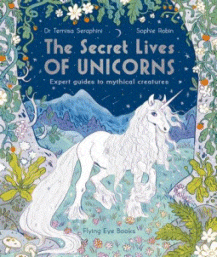
The Secret Lives of Unicorns
The Secret Lives of Unicorns
Dr Temisa Seraphini
Sophie Robin
Flying Eye, 2021
64pp., pbk., RRP $A24.99
9781838740504
Every parent, or grandparent, of a young girl up to about 9 will be aware of the fascination that unicorns continue to hold, their mystique never waning. Thus this is the perfect book for those who want to find out more about who and what they really are, where they live and the various species of them. For not all unicorns are the same with short hair and rainbow manes.
This exposé by the equally mysterious Dr Temisa Seraphina (who may or may not be the expert behind The Secret Lives of Dragons and The Secret Lives of Mermaids) reveals everything about this magical creature from its origins and evolution to the truth about the myths and tall tales. It shows how they are so rarely seen these days because the world is no longer what it used to be, and encourages today’s believers to think about the present day environment and what they might be able to do to improve it so unicorns can once again roam as freely as they used to.
As with the others in the series, taking a fantasy subject and treating in a factual way, just as any non fiction text on any other species, is an intriguing way of not only feeding the child’s thirst for knowledge about the particular creature but also to the concept of non fiction itself, bridging the gap between imagination and information in an absorbing way.
About 20 years ago, a collection of books known as the Ology series which focused on a range of fantasy and not-so creatures in a similar way, began appearing, offering the newly independent readers of the time an insight into the lives and times of creatures like dragons, wizards, ghosts and others and it was the lucky looker who found one on the shelves. I predict this new series (and hopefully there are more) will be just as popular when this new generation is introduced to it, and what better way to transition from fiction to non fiction, both as reader and teacher.
